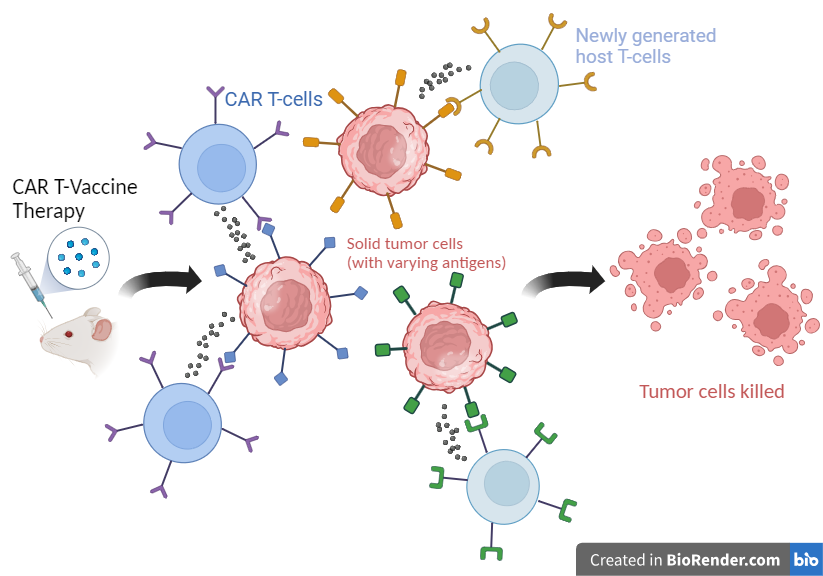Will there ever be a cure for cancer? There is one, sort of, and it’s been on the market for over 5 years (Chen & Miller, 2022). So why don’t we hear more about patients being cured? The technology, called chimeric antigen receptor T-cell (CAR-T) therapy, is actively used by doctors for some forms of liquid cancers but was not as promising for solid tumors until a recent study published in Cell (Irvine, 2023).
CAR-T therapy is a personalized treatment that involves harvesting and engineering patients’ T-cells, which are the fighter cells in the immune system. T-cells naturally have receptors on their surfaces that bind to antigens, which are 'ID tags' on the surfaces of invading cells informing your body that they’re intruders. T cell receptors bind to only one type of antigen, and they clasp together in a complementary fit similar to a key in a lock. If the process occurs properly, it triggers our immune system to destroy the unwelcome guest (National Cancer Institute, 2022). In the case of cancer, often a patient’s natural T-cells aren’t programmed with receptors compatible with their tumor’s antigens (Understanding Cancer Immunotherapy Research, 2020). CAR-T solves this problem by artificially producing receptors on T-cells that specifically target the patient’s cancer cells and eliminate them.
Thus far, the technique has been quite successful in eradicating liquid tumors in the blood and lymph, such as leukemia and lymphoma (National Cancer Institute, 2022). Doctors point to Emily Whitehead, who was only 6 years old when receiving the technology, as being the first CAR-T pioneer success story (Cancer Research Institute, 2021). 2023 marks her 11th year of being cancer free, which has inspired at least 20,000 others to receive the transformative therapy in hopes of achieving the same results (Boettner, 2023).
However, for most cancer patients, this revolutionary treatment is unfortunately not an option. About 90% of cancer diagnoses fall into the 'solid tumor' class, which are much more challenging to treat compared to liquid ones (American Cancer Society, 2023). Solid tumors (such as breast, lung, and skin tumors) tend to exhibit greater antigen heterogeneity, which, as the name suggests, means that some tumor cells express the targeted antigen while others don't (Grens, 2019). This poses a problem since artificial CAR T-cells are engineered to bind only to a specific antigen, leaving the majority of the tumor unbound and uneliminated. Additionally, the solid tumor microenvironment (TME) is filled with molecular complexities that support cancer growth and work against CAR T-cells (Yan, 2023). These challenges have compelled scientists to search for a viable improvement to traditional CAR-T therapy.
Recently, MIT researchers may have found that very breakthrough. They have developed a companion vaccine that works alongside CAR-T therapy and dramatically boosts the immune response in mice with glioblastoma, a solid cancer of the brain. The vaccine is composed of the target antigen and other ingredients that enhance immunity. Post-injection, its contents migrate to lymph nodes and help to generate new host T-cells that can target more cancer antigen types, a process called antigenic spreading. Antigenic spreading combats tumor antigen heterogeneity, thus eradicating the cancer more thoroughly.
Furthermore, the CAR T-vax combination therapy can overcome the challenges of the TME by increasing the production of IFN-γ cytokines (stimulants that enhance the effectiveness of CAR T-cells as cancer assassins) and recruiting fortified immune cells to patrol the tumor area. Researchers tested the vaccine in mice with varying levels of the target antigen and achieved high success with the CAR T-vax synergy (Irvine, 2023). In a group of mice that expressed only 80% of the target antigen, almost all of them were completely free of glioblastoma (Irvine, 2023). With these promising findings in mind, scientists at Elicio Therapeutics are currently developing the vaccine for human trials (Irvine, 2023).
While it may take years of clinical trials before doctors can finally declare a patient with solid tumors cancer-free, this new finding certainly is a large step in the right direction towards extinguishing one of society’s greatest foes. From the success in liquid tumor treatment to the newly found promise in solid tumor treatments, the rapid development of medical therapeutics in the past decade is proof that a “solid” cure for cancer is within reach.

References
Chen, A., & Miller, K. (2022, February 2). Researchers label early CAR-T cancer therapy patient 'cured'. STAT News. Retrieved August 1, 2023, from https://www.statnews.com/2022/02/02/cart-cancer-therapy-leukemia-treatment/
Irvine, D. (2023). Vaccine-boosted CAR T crosstalk with host immunity to reject tumors with antigen heterogeneity. Cell, 186(15), 30. https://www.cell.com/cell/fulltext/S0092-8674(23)00642-6?rss=yes&utm_source=dlvr.it&utm_medium=twitter#secsectitle0040
CAR T Cells: Engineering Immune Cells to Treat Cancer. (2022, March 10). National Cancer Institute. Retrieved August 1, 2023, from https://www.cancer.gov/about-cancer/treatment/research/car-t-cells
What is T cell therapy? (n.d.). Understanding Cancer Immunotherapy Research. Retrieved August 1, 2023, from https://www.ucir.org/therapies/therapy-cell-therapy
Emily Whitehead. (2021, August). Cancer Research Institute. Retrieved August 1, 2023, from https://www.cancerresearch.org/stories/patients/emily-whitehead
Boettner, B. (2023, February 10). CAR-T cell cancer immunotherapy gets personal. Harvard John A. Paulson School of Engineering and Applied Sciences. Retrieved August 1, 2023, from https://seas.harvard.edu/news/2023/02/car-t-cell-cancer-immunotherapy-gets-personal
2023 Cancer Facts & Figures. (2023, January 12). https://www.cancer.org/research/cancer-facts-statistics/all-cancer-facts-figures/2023-cancer-facts-figures.html
Grens, K. (2019, April 1). Infographic: CAR-T Cells in Solid Versus Liquid Cancers. The Scientist. Retrieved August 1, 2023, from https://www.the-scientist.com/infographics/infographic--car-t-cells-in-solid-versus-liquid-cancers-65671
Ma, Y., Li, W., Ma, K., Wang, T., & Feng, H. (2022). Cell Surface Markers and their Targeted Drugs in Breast Cancer. Current protein & peptide science, 23(5), 335–346. https://doi.org/10.2174/1389203723666220530102720
Yan, T. (2023, January 27). Current advances and challenges in CAR T-Cell therapy for solid tumors: tumor-associated antigens and the tumor microenvironment - Experimental Hematology & Oncology. Experimental Hematology & Oncology. Retrieved August 1, 2023, from https://ehoonline.biomedcentral.com/articles/10.1186/s40164-023-00373-7
